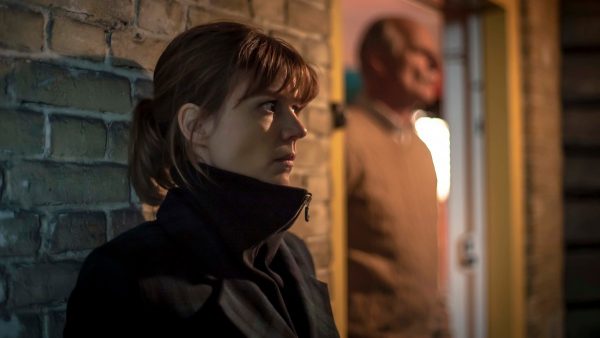The Columnist, 2019.
Directed by Ivo van Aart.
Starring Katja Herbers, Claire Porro, Bram van der Kelen and Rein Hofman.
SYNOPSIS:
Worn down by constant, vile abuse on social media, a newspaper columnist begins to track down and kill those who threaten her life online.
The opening scenes of Dutch horror-comedy The Columnist are as striking as they are familiar. Left-wing lifestyle journalist Femke Boot (Katja Herbers) has been invited on to a TV panel to discuss online trolling and abuse. She’s pitted against the snarky, misogynistic horror writer Steven Death (Bram van der Kelen), who thinks she just needs to brush it off and accept that it goes with the territory. He doesn’t quite call her a “snowflake”, but it’s on the tip of his tongue. It’s an arresting opening for a zeitgeisty black comedy that features as many severed fingers as it does mean tweets.
Femke is supposed to be working on her first novel, but she is continuously distracted by the onslaught of personal insults, graphic descriptions of sexual violence and death threats against her. She notes that one such message is accompanied by the name and face of her next-door neighbour (Rein Hofman) and, within a day or so, she has pushed him off a roof and to his death. The rush of catharsis leads to an accompanying burst of creativity, which drives Femke to seek out more of her abusers and challenge them – at first verbally, but ultimately and inevitably with violence.
There’s no denying the smartness of the concept here, which feeds into a similar zeitgeist to the awards contender Promising Young Woman in focusing on a woman fighting back against men who strengthen the corrosive atmosphere of toxic masculinity. Unlike Emerald Fennell’s movie, though, The Columnist introduces precious few wrinkles beyond that basic notion. That initial premise is potentially compelling, but it doesn’t take the movie very long to completely run out of ideas.
The problem is that the film is unwilling to express a clear point of view on its protagonist. The first act builds empathy between the audience and Femke, assisted by Herbers’s eloquent and well-studied performance. Once she starts hacking and slashing her way through trolls, though, the movie never really poses the moral question as to whether her course of action is the correct one. Even the about-face of Van Der Kelen’s character – who reveals his unpleasantness to be “a character” constructed to sell his macabre books and subsequently dates Femke – provides little room for the movie to look further into the dynamics at its heart.
Matters aren’t helped by a sub-plot in which Femke’s daughter Anna (Claire Porro) clashes with her school principal over matters of free speech. Porro’s performance as an impassioned youngster is one of the most intriguing aspects of the movie, but the storyline feels like an exercise in padding out the running time rather than making a broader point. Even second-half tension between her and Steven comes to nothing as the film rushes to a conclusion which refuses to confront the potentially complex issues that have been raised during the story.
Van Aart’s direction, to his credit, commits to an intriguing, comedic tone with a somewhat matter-of-fact approach to the violence. Another of its modern bedfellows would be Alice Lowe’s Prevenge, though the lack of grit and curiosity in the way The Columnist approaches its protagonist and her actions means that it suffers from being pitted against Lowe’s fiercely individual movie. Van Aart and screenwriter Daan Windhorst deliver some convincing moments of darkness and a handful of decent laughs, but the shocks peak early and the third act feels generic in the way everything spirals out of Femke’s control. When it should become knottier and more difficult, it tends inexorably towards the simplistic.
It’s a shame that The Columnist falls so short given the potentially incendiary nugget at its core. But despite the unquestionable timeliness of exploring social media abuse targeted at women in the public eye, the movie doesn’t get much further than its “what if she kills people?” idea. By the time the credits roll, it feels somewhat hollow and surface-level. Stating that this sort of abuse exists is nothing new, and the idea of a female vigilante – even one powered by a performance this good – isn’t as novel as it once was. This is a film that sets up all of the pieces for a real exploration of actions, consequences and how those ideas translate to the online space – only to log off before it finds satisfying answers.
Flickering Myth Rating – Film: ★ ★ / Movie: ★ ★ ★
Tom Beasley is a freelance film journalist and wrestling fan. Follow him on Twitter via @TomJBeasley for movie opinions, wrestling stuff and puns.















